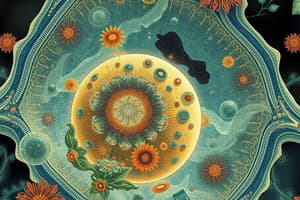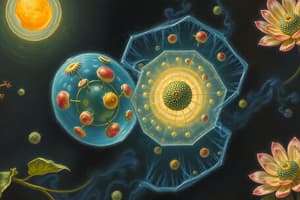Podcast
Questions and Answers
What is the ability of an organism to keep a constant internal state called?
What is the ability of an organism to keep a constant internal state called?
Homeostasis
Which of the following cells require energy to perform their functions? (Select all that apply)
Which of the following cells require energy to perform their functions? (Select all that apply)
- Skeletal cells (correct)
- Intestinal cells (correct)
- Heart cells (correct)
- Skin cells
Who invented the first primitive microscope?
Who invented the first primitive microscope?
Zacharias Janssen
What is the fundamental unit of life?
What is the fundamental unit of life?
Cells come from spontaneous generation.
Cells come from spontaneous generation.
Which scientist observed cork cells under a microscope?
Which scientist observed cork cells under a microscope?
What do immune cells protect against?
What do immune cells protect against?
Which principle states that every living organism consists of one or more cells?
Which principle states that every living organism consists of one or more cells?
Who proposed that all plants are composed of cells?
Who proposed that all plants are composed of cells?
What is the term for an organism's ability to maintain a constant internal state?
What is the term for an organism's ability to maintain a constant internal state?
The process of perspiration serves as the ______ system to remove excess heat in the body.
The process of perspiration serves as the ______ system to remove excess heat in the body.
Which cells require energy to perform specific functions? (Select all that apply)
Which cells require energy to perform specific functions? (Select all that apply)
The principle that states every living organism consists of one or more cells is false.
The principle that states every living organism consists of one or more cells is false.
Who invented the first primitive microscope?
Who invented the first primitive microscope?
Which scientist observed cork cells under a microscope?
Which scientist observed cork cells under a microscope?
Who disproved the spontaneous generation theory?
Who disproved the spontaneous generation theory?
What significant contribution did Anton van Leeuwenhoek make?
What significant contribution did Anton van Leeuwenhoek make?
What did Matthias Schleiden propose?
What did Matthias Schleiden propose?
What was Theodor Schwann's contribution to cell theory?
What was Theodor Schwann's contribution to cell theory?
What principle states that all cells come from pre-existing cells?
What principle states that all cells come from pre-existing cells?
Match the following scientists with their contributions to cell theory:
Match the following scientists with their contributions to cell theory:
Flashcards are hidden until you start studying
Study Notes
General Functions of the Cell
- Homeostasis is the ability of organisms to maintain a constant internal state, vital for normal cell function.
- Cells require specific conditions for optimal operation, affected by temperature and energy levels.
- Energy in cells is derived from chemical bonds in food, necessary for activities including:
- Heart cells pumping blood
- Intestinal cells digesting food
- Skeletal cells enabling motion
- Nerve cells conducting information
- Cells must detect environmental changes to generate appropriate responses, ensuring a stable internal environment.
- Protection is provided through mechanisms such as:
- Tanned skin, which releases more pigment to protect against UV radiation.
- Immune cells that defend against pathogens entering the body.
History of the Development of Cell Theory
- Zacharias Janssen invented the first primitive microscope in the early 17th century.
- Robert Hooke examined cork cells under a microscope, introducing the concept of "cells."
- Francesco Redi challenged spontaneous generation with experiments.
- Anton van Leeuwenhoek utilized his microscope to observe microorganisms.
- Matthias Schleiden posited that all plants are made of cells.
- Theodor Schwann suggested that all animals comprise cells.
- Rudolf Virchow established the principle that all cells arise from pre-existing cells.
The Three Principles of Cell Theory
- Principle 1: All living organisms consist of one or more cells, distinguishing unicellular from multicellular organisms based on complexity.
- Principle 2: The cell is the fundamental unit of life, being both the smallest structural and functional unit across all organisms.
- Principle 3: Cells arise from pre-existing cells, with hereditary material passed to daughter cells during division.
General Functions of the Cell
- Homeostasis is the ability of organisms to maintain a constant internal state, vital for normal cell function.
- Cells require specific conditions for optimal operation, affected by temperature and energy levels.
- Energy in cells is derived from chemical bonds in food, necessary for activities including:
- Heart cells pumping blood
- Intestinal cells digesting food
- Skeletal cells enabling motion
- Nerve cells conducting information
- Cells must detect environmental changes to generate appropriate responses, ensuring a stable internal environment.
- Protection is provided through mechanisms such as:
- Tanned skin, which releases more pigment to protect against UV radiation.
- Immune cells that defend against pathogens entering the body.
History of the Development of Cell Theory
- Zacharias Janssen invented the first primitive microscope in the early 17th century.
- Robert Hooke examined cork cells under a microscope, introducing the concept of "cells."
- Francesco Redi challenged spontaneous generation with experiments.
- Anton van Leeuwenhoek utilized his microscope to observe microorganisms.
- Matthias Schleiden posited that all plants are made of cells.
- Theodor Schwann suggested that all animals comprise cells.
- Rudolf Virchow established the principle that all cells arise from pre-existing cells.
The Three Principles of Cell Theory
- Principle 1: All living organisms consist of one or more cells, distinguishing unicellular from multicellular organisms based on complexity.
- Principle 2: The cell is the fundamental unit of life, being both the smallest structural and functional unit across all organisms.
- Principle 3: Cells arise from pre-existing cells, with hereditary material passed to daughter cells during division.
Studying That Suits You
Use AI to generate personalized quizzes and flashcards to suit your learning preferences.




